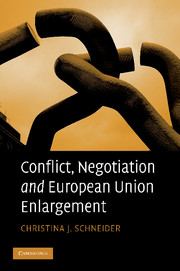Book contents
- Frontmatter
- Contents
- List of Illustrations
- List of Tables
- List of Acronyms
- Acknowledgements
- 1 Introduction
- 2 EU enlargements and transitional periods
- 3 A rationalist puzzle of EU enlargement?
- 4 A theory of discriminatory membership
- 5 EU enlargement, distributional conflicts, and the demand for compensation
- 6 The discriminatory of membership
- 7 Discriminatory membership and intra-union redistribution
- 8 Conclusion
- Bibliography
- Index
6 - The discriminatory of membership
Published online by Cambridge University Press: 17 July 2009
- Frontmatter
- Contents
- List of Illustrations
- List of Tables
- List of Acronyms
- Acknowledgements
- 1 Introduction
- 2 EU enlargements and transitional periods
- 3 A rationalist puzzle of EU enlargement?
- 4 A theory of discriminatory membership
- 5 EU enlargement, distributional conflicts, and the demand for compensation
- 6 The discriminatory of membership
- 7 Discriminatory membership and intra-union redistribution
- 8 Conclusion
- Bibliography
- Index
Summary
The enlargement of the European Union often causes conflict about the distribution of costs and benefits among members. States that receive significant agricultural subsidies oppose the unconditional accession of applicants with large and inefficient agricultural sectors. States that are eligible for structural subsidies expect competition for these funds from relatively large and poor newcomers with inadequately developed infrastructure. States that project high unemployment fear the liberalization of the labor market for relatively poor neighbors. EU member states that expect net losses from these distributional conflicts can stall negotiations and threaten to sabotage enlargement unless the relative winners within or without the Union agree to defray some of these costs. However, there have been many instances of candidates acceding unconditionally despite such opposition. In fact, some candidates did not have to accept any limitations on their membership even though some members had threatened to veto enlargement if these applicants were to accede without transitional differentiation.
In this chapter I evaluate the second set of hypotheses: When do EU members and candidates agree to implement transitional qualifications of membership rights for the acceding states? My theory of differentiated membership predicts that this stage of the accession negotiations will be crucial for explaining the outcomes of the enlargement process because this is where the distributional conflict can be resolved. When one or more EU members expect net losses and ask for discriminatory measures against newcomers, enlargement cannot succeed without additional conditions.
- Type
- Chapter
- Information
- Conflict, Negotiation and European Union Enlargement , pp. 138 - 157Publisher: Cambridge University PressPrint publication year: 2008

